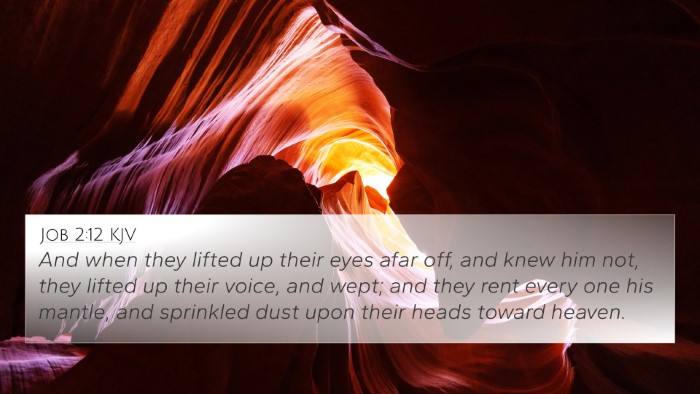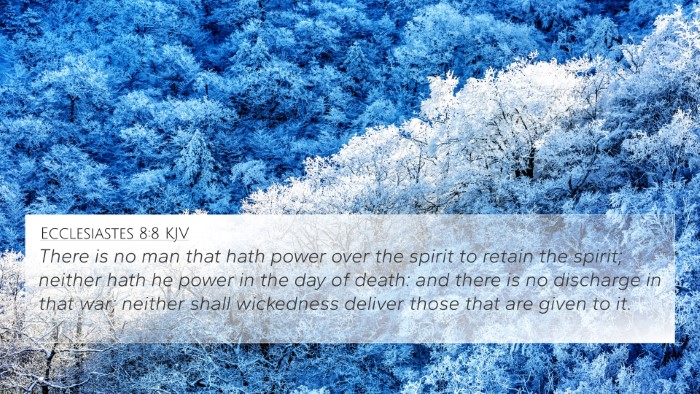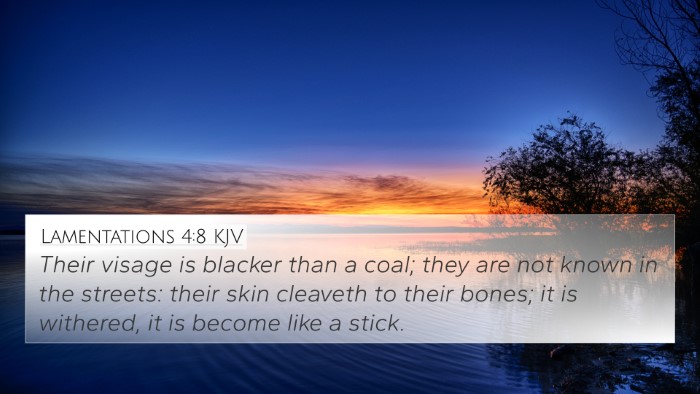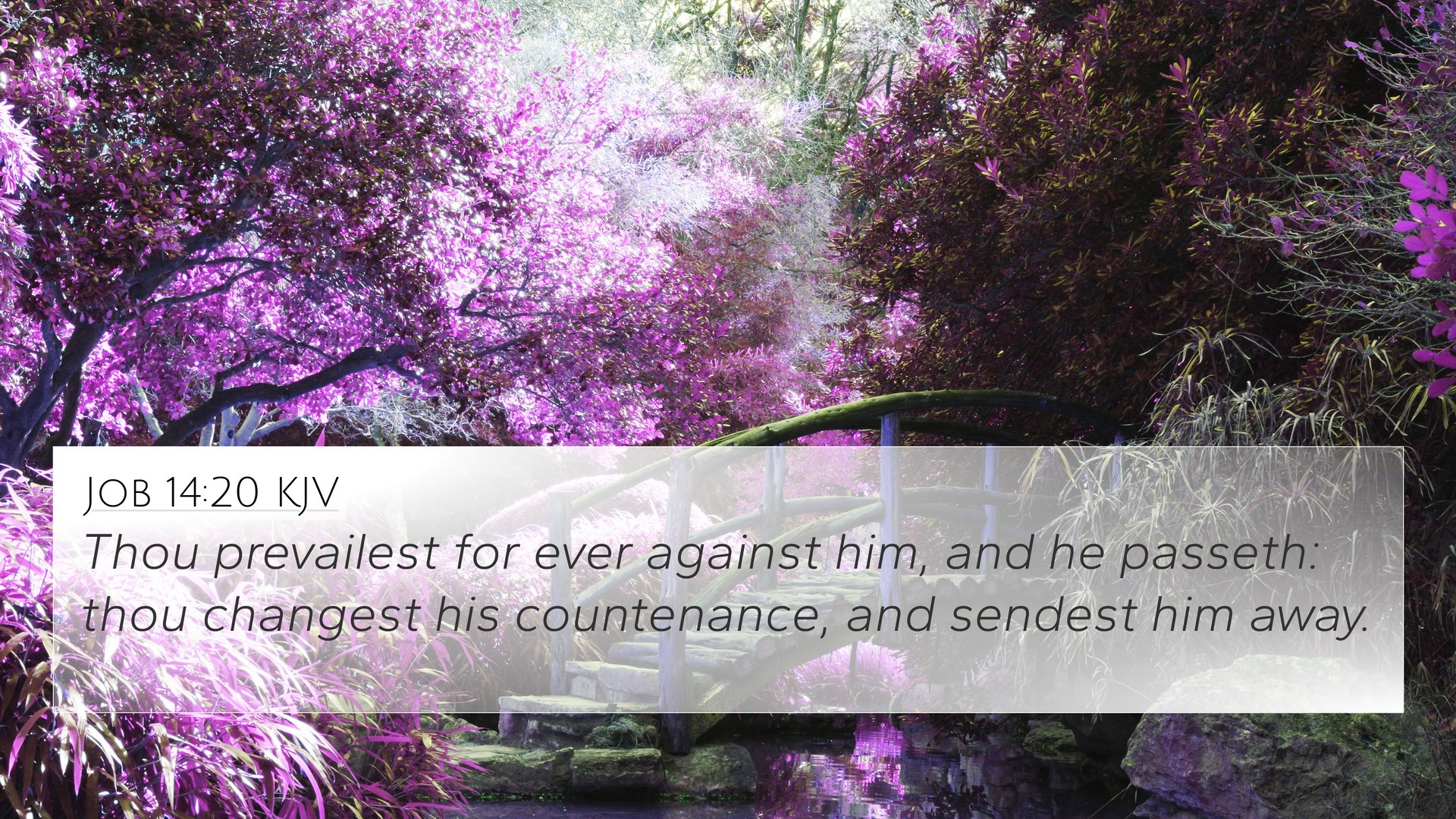Old Testament
Genesis Exodus Leviticus Numbers Deuteronomy Joshua Judges Ruth 1 Samuel 2 Samuel 1 Kings 2 Kings 1 Chronicles 2 Chronicles Ezra Nehemiah Esther Job Psalms Proverbs Ecclesiastes Song of Solomon Isaiah Jeremiah Lamentations Ezekiel Daniel Hosea Joel Amos Obadiah Jonah Micah Nahum Habakkuk Zephaniah Haggai Zechariah MalachiJob 14:20 Similar Verses
Job 14:20 Cross References
Thou prevailest for ever against him, and he passeth: thou changest his countenance, and sendest him away.
Uncover the Rich Themes and Topics of This Bible Verse
Listed below are the Bible themes associated with Job 14:20. We invite you to explore each theme to gain deeper insights into the Scriptures.
Job 14:20 Cross Reference Verses
This section features a detailed cross-reference designed to enrich your understanding of the Scriptures. Below, you will find carefully selected verses that echo the themes and teachings related to Job 14:20 KJV. Click on any image to explore detailed analyses of related Bible verses and uncover deeper theological insights.

Job 2:12 (KJV) »
And when they lifted up their eyes afar off, and knew him not, they lifted up their voice, and wept; and they rent every one his mantle, and sprinkled dust upon their heads toward heaven.

Job 14:14 (KJV) »
If a man die, shall he live again? all the days of my appointed time will I wait, till my change come.

Ecclesiastes 8:8 (KJV) »
There is no man that hath power over the spirit to retain the spirit; neither hath he power in the day of death: and there is no discharge in that war; neither shall wickedness deliver those that are given to it.

Lamentations 4:8 (KJV) »
Their visage is blacker than a coal; they are not known in the streets: their skin cleaveth to their bones; it is withered, it is become like a stick.
Job 14:20 Verse Analysis and Similar Verses
Understanding Job 14:20
Job 14:20: "Thou prevailest forever against him, and he passeth; thou changest his countenance, and sendest him away."
This verse captures the profound sense of humanity’s frailty in the face of mortality and divine sovereignty. The verse reflects Job's acknowledgment of God's overwhelming power over human life, emphasizing themes of mortality, divine judgment, and the transient nature of existence.
Summary of Insights from Commentaries
The following are insights derived from public domain commentaries, including those by Matthew Henry, Albert Barnes, and Adam Clarke, focusing on the theological implications and practical applications of this verse.
Mortality and Divine Authority
Matthew Henry articulates that Job realizes his own mortality in contrast to God's eternal authority. The permanence of divine will highlights human fragility, which is a common theme throughout Scripture.
- Life is fleeting, yet God's plan persists.
- Job's grief reflects the universal human condition of suffering and helplessness.
The Nature of Suffering
Albert Barnes discusses how Job, in his lament, expresses the futility of human endeavor in the light of divine will. This can be seen as a recognition that all of life’s struggles are pivoted on God’s greater purpose, even amidst pain and loss.
- Suffering often leads to spiritual introspection and growth.
- God's sovereign control reassures believers of His ultimate plan despite present anguish.
The Changing Countenance
Adam Clarke observes the phrase "changest his countenance" as indicative of how external life circumstances can impact a person’s inner state. In times of distress, one can still maintain hope in God’s steadfastness and unchanging nature.
- Even when life’s circumstances change, God's character remains the same.
- Job's expression reflects a deep-seated desire for understanding and justice in suffering.
Connections to Other Bible Verses
This verse is interconnected with several other Bible verses that explore similar themes:
- Ecclesiastes 3:20: "All go to one place; all are from the dust, and to dust all return." This underscores the common fate of all humanity.
- Psalms 39:4-5: "O Lord, make me know my end and what is the measure of my days; let me know how fleeting I am!" This relates to the awareness of mortality Job expresses.
- Isaiah 40:6-8: "All flesh is grass, and all its beauty is like the flower of the field..." This verse emphasizes the transitory nature of human life.
- James 4:14: "What is your life? For you are a mist that appears for a little time and then vanishes." This also aligns with Job’s reflections on life’s brevity.
- Romans 8:28: "And we know that for those who love God all things work together for good..." This provides context for understanding God’s purpose amidst suffering.
- 2 Corinthians 4:16-18: "So we do not lose heart. Though our outer self is wasting away, our inner self is being renewed..." This offers reassurance about hope beyond present afflictions.
- Job 7:17-19: "What is mankind that you make so much of them, that you give them so much attention..." Reflecting on God’s personal involvement with humanity amidst pain.
Thematic Connections in the Bible
Job 14:20 can serve as a bridge to explore numerous themes within the Scriptures. Here are some thematic connections:
- The Nature of God’s Sovereignty: God’s control over life and death, illustrated throughout Scripture.
- The Issue of Human Suffering: Explored in texts concerning suffering, such as 1 Peter 5:10 and Romans 5:3-5.
- Human Frailty: Recognized in various passages, highlighting the spiritual need for reliance on God.
- The Promise of Redemption: Despite mortality, Scripture offers glimpses of hope and resurrection through Christ’s triumph over death.
Cross-Referencing Biblical Texts
Effective Bible study involves cross-referencing texts to better understand the interwoven narratives and teachings found within the Bible. Here are some tools and methods:
- Bible Concordance: A useful tool that lists words and helps locate verses related to specific themes.
- Bible Cross-Reference Guide: Helps connect verses that discuss similar themes or concepts.
- Cross-Reference Bible Study: A method to study the Bible by examining connections and parallels between scriptures.
- Tools for Bible Cross-Referencing: Utilizing study Bibles, software, or online tools to find associated verses enhances comprehension.
Conclusion
Job 14:20 speaks profoundly about the nature of life, the inevitability of death, and God's overarching dominion over all creation. Through careful study and cross-referencing, one can deepen their understanding of these pivotal concepts within the biblical narrative.
Utilizing cross-referencing tools and methods enriches the Bible study experience, allowing for a more comprehensive grasp of Scripture’s interconnected nature. Understanding Job's experiences encourages believers to find hope even in the face of suffering, knowing that everything is under God's sovereign control.


